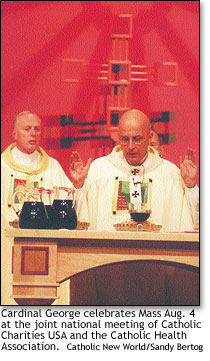 |
 |
|||||
 |
 |
 |
 |
 |
|||
| Conference celebrates social services, health care ministries By Michelle Martin Staff writer When more than 1,100 delegates from Catholic Charities USA and the Catholic Health Association gathered in Chicago Aug. 3-5, they came to celebrate a joint heritage of service to the poor and vulnerable and joint spirituality of caring. Father Bryan Hehir, president of Catholic Charities USA, and Father Michael Place, president and CEO of the Catholic Health Association, welcomed delegates by harkening back to the first 12 Ursuline sisters who arrived in New Orleans 275 years ago, establishing the first Catholic health and social services in what would become the United States. But for Passionist Father Donald Senior, who spoke with Mercy Sister Doris Gottemoeller about spirituality’s role in Catholic ministry, the roots go back to the Gospel. All four evangelists describe Jesus as a healer, and not only a healer of bodily illness, said Senior, president of Catholic Theological Union in Chicago. “The Gospel stories are social protests against exclusion, isolation or the dehumanization of any person,” he said, the same problems Catholic health care workers and social service providers fight today. “Please don’t forget that the ministries in which you are engaged stand at the very core of the mission of Jesus Christ.” While Senior and Gottemoeller looked at spirituality in Catholic ministries, Father Bryan Massingale of St. Francis Seminary in Milwaukee and Commonweal editor Margaret O’Brien Steinfels looked at the impact of religion in the public square. Catholics are now among the richest and the poorest people in America, those with the longest family histories here and the newest immigrants, Steinfels said. Those working for Catholic institutions become, for many, the public face of a large and diverse church, despite its current scandals. “You might not see yourselves as educational institutions, but you are,” she said. “Your work with the homeless, the dying, the poor, the new mothers, is absolutely defensible, and you are a Catholic presence. The Catholic presence is not solely episcopal.” The conference included a videotaped message from President Bush, praising members of both groups for the dedication to service. “You are prime examples of what I call armies of compassion,” the president said, before touting legislative initiatives to allow people who do not itemize tax deductions to deduct charitable contributions and to make it easier for faith-based service programs to get federal funding. Jim Towey, President Bush’s director of the Office for Faith-Based and Community Initiatives, struck many of the same notes in a speech peppered with anecdotes about Mother Teresa, whom he worked with as an attorney for 12 years and as a full-time volunteer in an AIDS home for one year. (See The Interview, Page 7.) “I have a great admiration for the good work that you do,” Towey said, recalling the Catholic Charities people he met at the AIDS home. “I was privileged to see your shared sense of the priceless God-given human dignity of every man, woman and child … this imprint of the divine image that can’t be erased by old age, that can’t be erased by illness or disability.” Despite the celebratory tone, an undercurrent of discussion about the clergy sexual abuse scandal permeated many of the conversations and was addressed at a special general session Aug. 4, as well as in some of the plenary sessions Aug. 3. Jesuit Father Thomas Reese, a political scientist and editor of America, was part of a four-person panel at the general session. He said that many of the church’s traditional sources of political influence have not been compromised. The church still has expert staff working on a variety of issues, - a clear, focused agenda based on Catholic social teaching and is still the largest provider of human services in the United States. What has been affected is the moral authority of the church hierarchy, Reese said. “There was a time when everybody wanted a bishop at their press conference,” he said. “That has changed.” Reese and other speakers pointed to the dedication of the people in Catholic social service and health ministries as a positive sign of the church in the United States. But in his homily at the Aug. 4 Mass, Cardinal George reminded the congregation that all people are broken, just as Jesus broke the bread in the Gospel story of the loaves and the fishes and just as Jesus himself was broken on the cross. “If that brokenness serves only to turn us into ourselves it is wasted and not eucharistic,” the cardinal said. “But if it enables someone to live with genuine compassion, in that compassion created through brokenness there is an availability. We are broken people so that we can be given. That is why we break the bread in the Eucharist.” The joint meeting was preceded by two days of conferences for Catholic Charities USA, with sessions on the follow-up to Sept. 11 and a hearing on what Catholic Charities’ legislative agenda should include. The Catholic Health Association held its own meetings following the joint session, with an address by former U.S. ambassador to the Vatican Lindy Boggs. Front Page | Digest | Cardinal | Interview |
|||